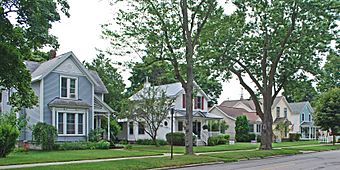Boardman Neighborhood Historic District facts for kids
Quick facts for kids |
|
|
Boardman Neighborhood Historic District
|
|
 |
|
| Location | Roughly bounded by State and Webster Sts., and Railroad and Boardman Aves., Traverse City, Michigan |
|---|---|
| Area | 52 acres (21 ha) |
| Architectural style | Queen Anne |
| NRHP reference No. | 78001498 |
| Added to NRHP | October 3, 1978 |
The Boardman Neighborhood Historic District is a special old neighborhood in Traverse City, Michigan. It's a place where many historic homes are located. This district is found between State Street, Webster Street, Railroad Avenue, and Boardman Avenue. It was officially recognized as a historic place in 1978.
Contents
A Look Back: History of Boardman Neighborhood
How It Started: The Lumber Boom
The Boardman Neighborhood began to grow when Traverse City was booming. This was because of the big lumber industry. Many important people from Traverse City built their homes here. These included Captain Henry Boardman, the Havilands, and the Hulls. They built very fancy houses in this area.
Growing and Changing Over Time
Later, more homes were built for other people. These included shop owners and professionals. For example, Fair Oaks Terrace was built in the 1890s. These homes were often more modest.
A Time of Change and Renewal
In the 1920s, the neighborhood became less popular. Many of the big houses were changed into apartments. Some were even left empty. But in the 1970s, people started to fix up the neighborhood. It became a place for single families again.
Exploring the Boardman Neighborhood
What You'll See There
The Boardman Neighborhood Historic District has about 174 buildings. Most of these are well-kept Victorian-style houses. They are made of wood and covered with clapboard siding. The neighborhood is quite dense. Many houses are built on smaller lots.
Homes for Everyone
The buildings here show a wide range of styles. Some are grand houses built for the city's most important people. These were from the late 1800s. Others are simpler homes. These belonged to small business owners or people who worked for lumber companies.
More Than Just Homes
Even though it's mostly a neighborhood of homes, there are other buildings too. For example, the city's very first general hospital is located here.
Images for kids
 | Jessica Watkins |
 | Robert Henry Lawrence Jr. |
 | Mae Jemison |
 | Sian Proctor |
 | Guion Bluford |







